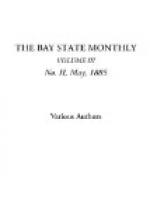“Will the wedding be on the anniversary of the other one?” asked Elizabeth. “I suppose it will,” she added; “Katie ought to have it so. That will come in three weeks. It will be a little time before you sail, if you go.” And she smiled rather sadly, then glanced about her to make sure that the last remark had not been overheard.
“Ah!” he said, “I see you know all about the scheme on foot. But it is safe to trust you. You are very much interested,” he added, watching her.
“Very much. My father does trust me a good deal. But I hope I shall not make him sorry for it.”
Archdale kept on looking at her, and smiling.
“You prefer making people glad,” he answered.
“But perhaps you will not go—now?” she said.
“Oh, yes. I promised my services to Colonel Pepperell last summer; that holds me, you see. Besides, I want to do my part.”
“I could not imagine you standing idle by while others were striking the blows for our country,” said Elizabeth. “Katie has told me a good deal about you at one time and another. Dear Katie!” she added in an undertone, with an exquisite gentleness in her face. Then, looking back from the window where her eyes had wandered, she turned off her emotion by some gay speech.
Very soon afterward the young man left her. For he was on his way to carry the news to Katie who was then in Boston visiting her aunt. But to go to her he passed Mr. Royal’s door, and his wishes, as well as his promise, made him delay his own happiness for a moment to see Elizabeth rejoice. He saw her rejoice to his heart’s content; and then he took leave of her for his happy meeting with his betrothed.
[TO BE CONTINUED.]
[Footnote 3: Copyright, 1884, by Frances C. Sparhawk.]
* * * * *
EDITOR’S TABLE.
Evidences are constantly multiplying that American history is a subject which has not lost its interest to investigators or to readers. During the past month four distinct works, namely, the fifth volume of Von Holst’s Constitutional History of the United States, the third of Schouler’s History of the United States, the second of McMaster’s History of the People of the United States, and also a new volume of Hubert Howe Bancroft’s History of the Pacific States, have been published, and are destined, no doubt, to take their places as “standards.” This diligence on the part of their respective writers, and the interest in them manifested by the great public is commendable, and in a measure dispels the oft-repeated saying that Americans are a nation of novel-readers.
It is gratifying, also, to record another fact. During the third week in July the Old South lectures for young people, illustrative of “The War for the Union,” were inaugurated in Boston. The ancient “meeting-house” was crowded with earnest students to hear the first lecture on slavery, delivered by William Lloyd Garrison, Jr. The speaker gave a vivid sketch of the chief events of the anti-slavery movement, and of the part taken by George Thompson, Garrison, Phillips, Whittier, and Harriet Martineau.




